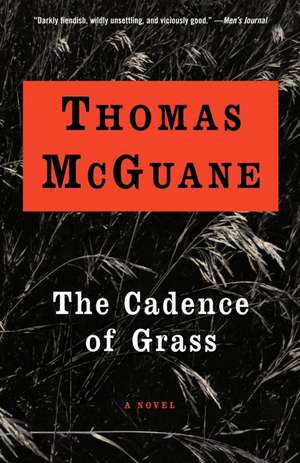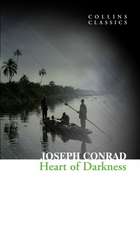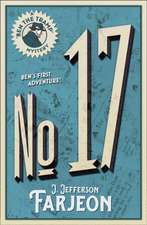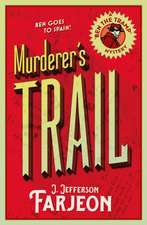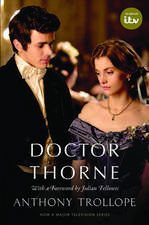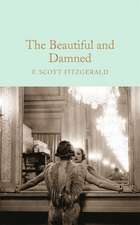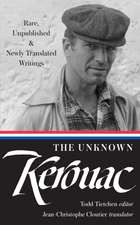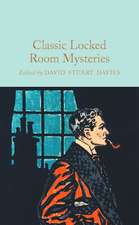The Cadence of Grass: Vintage Contemporaries
Autor Thomas McGuaneen Limba Engleză Paperback – 30 apr 2003
As played out on the majestic stage of Montana cattle country, the ensuing drama involves blood, money, sex, vengeance, and a cross-dressing rancher. The Cadence of Grass is renewed evidence that McGuane is one of the finest writers we have, capable of simultaneously burnishing and demolishing the mythology of the West while doing rope tricks with the English language.
| Toate formatele și edițiile | Preț | Express |
|---|---|---|
| Paperback (2) | 89.41 lei 22-36 zile | |
| VINTAGE BOOKS – 30 apr 2003 | 89.41 lei 22-36 zile | |
| Vintage Publishing – 28 feb 2003 | 99.69 lei 43-57 zile |
Din seria Vintage Contemporaries
-
 Preț: 109.95 lei
Preț: 109.95 lei -
 Preț: 101.80 lei
Preț: 101.80 lei -
 Preț: 96.52 lei
Preț: 96.52 lei -
 Preț: 107.46 lei
Preț: 107.46 lei -
 Preț: 91.77 lei
Preț: 91.77 lei -
 Preț: 100.35 lei
Preț: 100.35 lei -
 Preț: 111.51 lei
Preț: 111.51 lei -
 Preț: 96.11 lei
Preț: 96.11 lei -
 Preț: 96.93 lei
Preț: 96.93 lei -
 Preț: 97.34 lei
Preț: 97.34 lei -
 Preț: 111.92 lei
Preț: 111.92 lei -
 Preț: 117.87 lei
Preț: 117.87 lei -
 Preț: 95.92 lei
Preț: 95.92 lei -
 Preț: 113.56 lei
Preț: 113.56 lei -
 Preț: 101.88 lei
Preț: 101.88 lei -
 Preț: 108.09 lei
Preț: 108.09 lei -
 Preț: 115.42 lei
Preț: 115.42 lei -
 Preț: 106.04 lei
Preț: 106.04 lei -
 Preț: 99.75 lei
Preț: 99.75 lei -
 Preț: 90.64 lei
Preț: 90.64 lei -
 Preț: 87.84 lei
Preț: 87.84 lei -
 Preț: 99.60 lei
Preț: 99.60 lei -
 Preț: 105.41 lei
Preț: 105.41 lei -
 Preț: 99.30 lei
Preț: 99.30 lei -
 Preț: 120.26 lei
Preț: 120.26 lei -
 Preț: 103.74 lei
Preț: 103.74 lei -
 Preț: 100.98 lei
Preț: 100.98 lei -
 Preț: 100.76 lei
Preț: 100.76 lei -
 Preț: 89.09 lei
Preț: 89.09 lei -
 Preț: 115.94 lei
Preț: 115.94 lei -
 Preț: 101.34 lei
Preț: 101.34 lei -
 Preț: 125.13 lei
Preț: 125.13 lei -
 Preț: 89.50 lei
Preț: 89.50 lei -
 Preț: 132.88 lei
Preț: 132.88 lei -
 Preț: 93.85 lei
Preț: 93.85 lei -
 Preț: 89.91 lei
Preț: 89.91 lei -
 Preț: 106.45 lei
Preț: 106.45 lei -
 Preț: 119.87 lei
Preț: 119.87 lei -
 Preț: 107.92 lei
Preț: 107.92 lei -
 Preț: 77.02 lei
Preț: 77.02 lei -
 Preț: 125.21 lei
Preț: 125.21 lei -
 Preț: 105.82 lei
Preț: 105.82 lei -
 Preț: 112.11 lei
Preț: 112.11 lei -
 Preț: 83.94 lei
Preț: 83.94 lei -
 Preț: 96.93 lei
Preț: 96.93 lei -
 Preț: 97.15 lei
Preț: 97.15 lei -
 Preț: 88.62 lei
Preț: 88.62 lei -
 Preț: 111.76 lei
Preț: 111.76 lei -
 Preț: 129.78 lei
Preț: 129.78 lei -
 Preț: 100.57 lei
Preț: 100.57 lei
Preț: 89.41 lei
Nou
Puncte Express: 134
Preț estimativ în valută:
17.11€ • 18.60$ • 14.39£
17.11€ • 18.60$ • 14.39£
Carte disponibilă
Livrare economică 31 martie-14 aprilie
Preluare comenzi: 021 569.72.76
Specificații
ISBN-13: 9780679767459
ISBN-10: 0679767452
Pagini: 256
Dimensiuni: 132 x 204 x 14 mm
Greutate: 0.19 kg
Editura: VINTAGE BOOKS
Seria Vintage Contemporaries
ISBN-10: 0679767452
Pagini: 256
Dimensiuni: 132 x 204 x 14 mm
Greutate: 0.19 kg
Editura: VINTAGE BOOKS
Seria Vintage Contemporaries
Notă biografică
THOMAS McGUANE lives on a ranch in McLeod, Montana. He is the author of ten novels, including the National Book Award-nominated Ninety-two in the Shade, three works of nonfiction, and four collections of stories. His work has won numerous awards, including the Rosenthal Award of the American Academy and Institute of Arts and Letters, and has been anthologized in the Best American Stories, Best American Essays, and Best American Sporting Essays.
Extras
In most ways, old man Whitelaw's funeral was just another scene in the family's life. Paul Crusoe, estranged from Whitelaw's daughter Evelyn, a strong young woman with black hair that hung straight to her collar, was led to his mother-in-law's sitting room by Evelyn herself. Mrs. Whitelaw, who could act as oblivious as someone nearly blind, sat with Evelyn's sister, Natalie, whom Paul viewed as a high-strung, nasty girl who once caused all his problems and who for her part despised him unstintingly. On the side table was a Stockman's Journal and a CPR handbook. Natalie smoked and looked at Paul over her raised cigarette. The red hair was certainly not genuine.
Bill Champion, an old rancher and longtime partner of the deceased, looked in briefly. He was dressed for the occasion but the clothes belonged to an earlier era. His forehead was much paler than the rest of his face and his blue eyes were startling. From the cuffs of his jacket, once part of a suit, projected hands that looked too big. He exchanged a concerned glance with Mrs. Whitelaw, then left the family alone.
"Mother, you haven't said a word to Paul," Evelyn said with an anxious smile once Bill was gone.
"Oh, Paul," said Mrs. Whitelaw, seeming to awaken, "you're so considerate to have come." Evelyn toyed with the porcelain birds and turtles on the mantel while keeping a watchful eye on her mother.
"It's unfathomable," said Natalie.
Mrs. Whitelaw turned slowly toward her.
"I don't think so," said Mrs. Whitelaw blindly toward Paul. "Jim and Paul had so much in common, an adventurous spirit! So suspicious of everything too," she said. "It made the rest of us ordinary people feel we were in a wonderf--"
"A wonderful play," said Natalie.
"--ful whodunnit. But Paul, Father was much saddened by your divorce--"
"Saddened, illuminated, chastened," said Natalie. "Where are we going with this?"
"I liked you better when you were on drugs," Paul whispered to Natalie.
Natalie had recently graduated from rehab in Arizona, a pleasant milieu with celebrities arriving by helicopter.
"It was not drugs," she hissed. "It was rage. Justified rage. In any case, I wouldn't have otherwise flown a thousand miles to eat from a steam table, to share a room and to wear a breezy outfit that tied in back."
"No worries," said Paul. "It's behind you now, mate."
With feverish preoccupation, Evelyn tended to her mother, refilling tea and holding a tray of cookies at eye level. In truth, she was no more prepared for her father's funeral than she'd been for his death. And both she and her sister would soon discover how incomplete his departure had been.
"What exactly are you doing these days, Paul?" Natalie asked. "Anything illuminating for Mother at this very rough time in her life?"
"I, I--"
"Ay-yi-yi-yi? Is this the Mexican hat dance?"
"I was doing a project with...a firm--underwriters, really--doing debentures pertinent to the lumber business, or the wood products business would be more like it...." Paul knew perfectly well, if too late, that Natalie was well informed in these areas.
"Wood products debentures?"
"Something of a by-product of the days with those stock pickers, you remember, the small-capital and emerging- nations guys that--"
"Paul, you have no job, have you?"
"Not at the moment. Not much of anything. A bit of a day trader. I hope to return to the bottling plant."
Evelyn moved away in embarrassment, Paul's eyes following her.
"I'm sure you'll find something," said Natalie, holding her cigarette to her mouth and relighting it. "And Evelyn," she said, turning to her sister, "I was touched by your little grimace of sympathy, your pained embarrassment at all this unease. Paul, she still cares!"
Mrs. Whitelaw's eyes seemed to search around the room for the source of the discord. "Natalie," she said hopelessly, knowing there was never any cautioning Natalie, whose latest fear was that she had stopped emitting pheromones.
"Perhaps we both still care," said Paul. A touching remark, made to comfort Mrs. Whitelaw in her widowhood since neither of them cared anymore at all. It was surprising, really, that Natalie seemed to take him seriously enough to go on challenging the idea. Evelyn occasionally noted a visceral inclination toward her estranged husband, though it was not at all unmanageable.
"But all that water under the bridge! The otherwise admirable but nonmeshing complexities of character, the lack of the children, the--evidently!--dimming prospects of a nonstarter in the workplace!"
She was rolling now and Paul had her in his sights. Natalie found it difficult to listen while others were speaking, and her attention darted among trivia--silverware, matchbook covers, her napkin--practically anything in order to avoid listening. Whenever she herself spoke, she fastened on the listener's eyes, feeling that only absolute vigilance could prevent their attention from escaping.
"Natalie," Paul interrupted, "when you were on drugs, at least there was the initial euphoria. Perhaps we were insufficiently appreciative of that during the days of rage when you sought to recapture the original high. And certainly we remained unaware of the depth of your situation until you installed the cat door at your apartment so as to receive packages from your connection without burdensome conversations."
Natalie smiled at this recollection. "That was good, wasn't it?"
It was a sincere question, and reluctantly Paul's admiration of Natalie came back. They'd once had what she called quality sex, and perhaps its lingering tonalities were what now gave Evelyn such a lost look. She had been thrilled to be rid of Paul but would have preferred dumping him more felicitously than upon her own sister, who gave him an entirely too greedy welcome.
Mrs. Whitelaw, having fled the present scene into her own thoughts, capitalized on this first real pause to steer the conversation elsewhere, whether they liked it or not. The three of them knew ahead of time that what followed would be an analogue every bit as opaque as the most ancient aphorism.
"Explain this to me," Mrs. Whitelaw said with a certain eagerness. "I read in the Chronicle that a boat speeding down the Sewanee River--the Sewanee River!--hit a wave made by a water-skier and flew right through the window of a second-story condominium! Paul, you tell the girls and me: How can these things happen?"
"Mrs. Whitelaw, I--"
"Surely you know Stephen Foster's Way Down Upon the Sewanee River!"
Natalie left the cigarette dangling from her lips. "Mama, evidently times have changed way down upon the Sewanee--"
"How on earth does a speedboat fly into the second story of a condominium?"
"I don't know," Paul said as though genuinely puzzled. Actually, he was staring at the old Harry Winston choker bedecking Mrs. Whitelaw's bosom, wondering how it would fare in a death tax appraisal. All of them thought Mrs. Whitelaw had finished her venture in analogies, but in this they were not correct.
"According to the same issue of the Chronicle, a chicken, a pet, escapes its hutch in Greeley, Colorado, and walks forty miles to the other side of Denver through traffic, strip malls, gas stations, parking lots, followed everywhere by rumors and news reports. At one point they had a helicopter looking for this chicken, and the owner, an older gal, a waitress, trudged and rode and followed the rumor trail until fate brought this chicken to bay in the parking lot of Blockbuster Video! There--and this just makes me want to bawl--it was reunited with the old waitress. Who was no dope, because before she even fed that worn-out bird which I saw on TV and which looked like a piece of rag, before she'd even given this poor broken little thing a dish of water, she sold the film rights to Hollywood! No wonder my husband was ready to go!"
"Still, Mrs. Whitelaw," said Paul, who had rarely been this mentally bankrupt, "there's so much to be thankful for."
"Oh, Paul," said Natalie with contempt and pity as Mrs. Whitelaw belly laughed and pulled a handkerchief from her reticule with which to undampen her eyes.
Evelyn, looking on, recalled feeling that Paul Crusoe had never really been ready for this family. This sort of customary byplay between Paul and the sisters was nothing new and not nearly as resonant as it would become after Jim Whitelaw's will was read. For now, they lived on in a fool's paradise, brought together as a family by the apparently complete lack of feeling for the deceased.
Earlier, at the funeral itself, Mrs. Whitelaw, seated next to Paul during the long and tiresome service, wanted to know a few things about him; sotto voce, like a conspirator, she seemed not to be thinking about her husband at all.
"Were you a Boy Scout, Paul?"
"No."
"It wouldn't have mattered when you were young, of course, but the Boy Scouts are in hot water with the queers. It was in the Chronicle. Can you tell me briefly, Paul, why your marriage to Evelyn failed so suddenly? And be sure to make it brief."
"It wasn't sud--"
"It was the lack of children, wasn't it?"
"Actually, we--"
"I have no right to make these sorts of guesses, Paul. Other people's lives, even your own children's, are a complete mystery."
"Actually, we bo--"
"What's that?"
"We bored each other!"
"Don't raise your voice to me, Paul. Do you need money?"
"Not yours."
"Whatever could you mean by that?" Mrs. Whitelaw turned her attention to the service. "Isn't there going to be some sort of music?"
"I have no idea."
Paul's mother, Dr. Edith Crusoe, a Westernist at the University of Colorado at Boulder, chose this moment for a quiet arrival. She was not to stay for long. Indeed, she remained in her mackintosh, whose wide lapels rose around her ears as she sat quizzically regarding the coffin, her face lively and discontented. She murmured something that caused Alice Whitelaw to smile in modest gratitude, nodded rather formally to her son and snubbed Evelyn entirely.
Evelyn understood that had Dr. Crusoe not found something thematic in the funeral, something emblematic about low rainfall, say, she wouldn't have come at all. Evelyn surmised that as her father had owned a bottling plant Dr. Crusoe may have viewed him as an oligarch of moisture hoarding, and she imagined the passage wherein the descendants of mammoth hunters are bludgeoned into an ecological black hole by waves of coercive white men on horseback wielding Coca-Cola bottles. Partisan hyperbole had made Dr. Crusoe not just a professor but a public intellectual in the Northern Rockies, but Evelyn's views of her were unreasonable. She had never married and Paul was her only child. When the priest began to speak of the deceased and the meaning of his life, Dr. Crusoe rose sharply to her feet and departed, the crown of her head barely visible above the lapels of her coat.
The priest addressed his remarks to the coffin. Having not listened to anything until now, Paul and Mrs. Whitelaw found this completely baffling. Evelyn was discomfited to recognize in the sermon whole passages from that year's Farmers' Almanac.
"I see where they've made another movie about the Titanic," said Mrs. Whitelaw.
"That's right," Paul said, his eyes widening.
"What can they possibly add?"
"This time it floats," he said wearily.
"Oh, Paul, I find your humor rather extreme."
"Pay attention to your husband's funeral," he snapped. Mrs. Whitelaw looked at him, then suddenly crumpled and began sniveling into her handkerchief.
"This is what it feels like to be doomed," she said miserably.
"Oh, Mrs. Whitelaw, I'm so sorry."
"You will look after me, won't you, Paul?" Later he would wonder if her remark contained some premonition.
"Yes, Mrs. Whitelaw."
"I was doing so well, so detached--"
"Yes."
"Remarkably well, in view of circumstances. Now it is all falling, falling, falling, falling." Knowing that it would be only a short time before Mrs. Whitelaw was on the muscle again, Paul attempted to hold and comfort her, a dismal exercise. "What a shame we're losing you to our family, Paul. I'm glad Jim wasn't quite aware of it, he was so enfeebled toward the end, always with a hat on his head. Never wore a hat during his life unless it was dangerously cold out, but at the end it was always these awful red watch caps. He looked homeless. Perhaps when people reach that point they are homeless, aren't they, Paul? Are they finished up there?"
It looked as though they were. The priest had just finished saying something and had clasped his hands. It must have been something very good about heaven for him to chance such a puckish demeanor. But no, good God; he was addressing Mrs. Whitelaw, who hadn't heard a word he'd said. "I hope my words weren't inadequate, Mrs. Whitelaw. I remember Jim's opinion on long speeches all too well."
She gazed at him as though he were a pesky employee.
"That's not just Jim," said Mrs. Whitelaw with sudden authority. "That's the way the whole world feels."
The family was obliged to meet over and over again just to understand how the estate was to be probated because the last will and testament of the deceased was a "minefield," according to the attorney who drafted it. The daughters were so fixated on the attorney's dramatic hairdo that they often couldn't remember his name, but they recognized the will as pure Sunny Jim Whitelaw, attempting to bind his family to his wishes from beyond the grave. Alice was bequeathed a living from the bottling plant, of which Paul was appointed president and chief operating officer, at a handsome salary. Not a guaranteed red cent for anyone else. A provision, however, existed for the alteration of the conditions thus imposed. Should Paul and Evelyn cancel their plans for divorce, the profits of the business could be shared among all family members, or it could be sold and the proceeds divided. In any event, while it wouldn't make any of them wealthy, a degree of comfort and security was probable if, as the obnoxious attorney suggested, they behaved themselves. Natalie's husband, Stuart, said that the will reminded him of the Iron Maiden. Natalie called it proof of her father's hatred and emitted penetrating howls in the chambers of the probate judge. Stuart gave her a calming shoulder rub. Evelyn exhaled and said, "Ooh, boy," as her intention to divorce Paul was the single greatest act of defiance she had ever directed at her father. Paul had, through the confidences of Sunny Jim, known all along that if he stayed in the marriage, stayed in the family business, he could be reasonably expected to keep his trap shut. He had a copy of the will and put the cash-flow schematics in his wallet as though they were real money. Alice Whitelaw said that she felt secure and offered loans to her children. Knowing what a cheapskate she was, this provided scarce comfort to anyone; and when Paul gave her a congratulatory pat on the back, Evelyn heaved a sigh of heartfelt disgust.
The probate judge, a decent old man with snow white hair, found himself agitated by all the ill will and complication in this family. While offering them formal best wishes and the ongoing availability of his advice, he quietly and desperately hoped he never saw these people again, then darted off like a fugitive, describing the situation to the first colleague he ran into as "a chandelle off a shithouse."
From the Hardcover edition.
Bill Champion, an old rancher and longtime partner of the deceased, looked in briefly. He was dressed for the occasion but the clothes belonged to an earlier era. His forehead was much paler than the rest of his face and his blue eyes were startling. From the cuffs of his jacket, once part of a suit, projected hands that looked too big. He exchanged a concerned glance with Mrs. Whitelaw, then left the family alone.
"Mother, you haven't said a word to Paul," Evelyn said with an anxious smile once Bill was gone.
"Oh, Paul," said Mrs. Whitelaw, seeming to awaken, "you're so considerate to have come." Evelyn toyed with the porcelain birds and turtles on the mantel while keeping a watchful eye on her mother.
"It's unfathomable," said Natalie.
Mrs. Whitelaw turned slowly toward her.
"I don't think so," said Mrs. Whitelaw blindly toward Paul. "Jim and Paul had so much in common, an adventurous spirit! So suspicious of everything too," she said. "It made the rest of us ordinary people feel we were in a wonderf--"
"A wonderful play," said Natalie.
"--ful whodunnit. But Paul, Father was much saddened by your divorce--"
"Saddened, illuminated, chastened," said Natalie. "Where are we going with this?"
"I liked you better when you were on drugs," Paul whispered to Natalie.
Natalie had recently graduated from rehab in Arizona, a pleasant milieu with celebrities arriving by helicopter.
"It was not drugs," she hissed. "It was rage. Justified rage. In any case, I wouldn't have otherwise flown a thousand miles to eat from a steam table, to share a room and to wear a breezy outfit that tied in back."
"No worries," said Paul. "It's behind you now, mate."
With feverish preoccupation, Evelyn tended to her mother, refilling tea and holding a tray of cookies at eye level. In truth, she was no more prepared for her father's funeral than she'd been for his death. And both she and her sister would soon discover how incomplete his departure had been.
"What exactly are you doing these days, Paul?" Natalie asked. "Anything illuminating for Mother at this very rough time in her life?"
"I, I--"
"Ay-yi-yi-yi? Is this the Mexican hat dance?"
"I was doing a project with...a firm--underwriters, really--doing debentures pertinent to the lumber business, or the wood products business would be more like it...." Paul knew perfectly well, if too late, that Natalie was well informed in these areas.
"Wood products debentures?"
"Something of a by-product of the days with those stock pickers, you remember, the small-capital and emerging- nations guys that--"
"Paul, you have no job, have you?"
"Not at the moment. Not much of anything. A bit of a day trader. I hope to return to the bottling plant."
Evelyn moved away in embarrassment, Paul's eyes following her.
"I'm sure you'll find something," said Natalie, holding her cigarette to her mouth and relighting it. "And Evelyn," she said, turning to her sister, "I was touched by your little grimace of sympathy, your pained embarrassment at all this unease. Paul, she still cares!"
Mrs. Whitelaw's eyes seemed to search around the room for the source of the discord. "Natalie," she said hopelessly, knowing there was never any cautioning Natalie, whose latest fear was that she had stopped emitting pheromones.
"Perhaps we both still care," said Paul. A touching remark, made to comfort Mrs. Whitelaw in her widowhood since neither of them cared anymore at all. It was surprising, really, that Natalie seemed to take him seriously enough to go on challenging the idea. Evelyn occasionally noted a visceral inclination toward her estranged husband, though it was not at all unmanageable.
"But all that water under the bridge! The otherwise admirable but nonmeshing complexities of character, the lack of the children, the--evidently!--dimming prospects of a nonstarter in the workplace!"
She was rolling now and Paul had her in his sights. Natalie found it difficult to listen while others were speaking, and her attention darted among trivia--silverware, matchbook covers, her napkin--practically anything in order to avoid listening. Whenever she herself spoke, she fastened on the listener's eyes, feeling that only absolute vigilance could prevent their attention from escaping.
"Natalie," Paul interrupted, "when you were on drugs, at least there was the initial euphoria. Perhaps we were insufficiently appreciative of that during the days of rage when you sought to recapture the original high. And certainly we remained unaware of the depth of your situation until you installed the cat door at your apartment so as to receive packages from your connection without burdensome conversations."
Natalie smiled at this recollection. "That was good, wasn't it?"
It was a sincere question, and reluctantly Paul's admiration of Natalie came back. They'd once had what she called quality sex, and perhaps its lingering tonalities were what now gave Evelyn such a lost look. She had been thrilled to be rid of Paul but would have preferred dumping him more felicitously than upon her own sister, who gave him an entirely too greedy welcome.
Mrs. Whitelaw, having fled the present scene into her own thoughts, capitalized on this first real pause to steer the conversation elsewhere, whether they liked it or not. The three of them knew ahead of time that what followed would be an analogue every bit as opaque as the most ancient aphorism.
"Explain this to me," Mrs. Whitelaw said with a certain eagerness. "I read in the Chronicle that a boat speeding down the Sewanee River--the Sewanee River!--hit a wave made by a water-skier and flew right through the window of a second-story condominium! Paul, you tell the girls and me: How can these things happen?"
"Mrs. Whitelaw, I--"
"Surely you know Stephen Foster's Way Down Upon the Sewanee River!"
Natalie left the cigarette dangling from her lips. "Mama, evidently times have changed way down upon the Sewanee--"
"How on earth does a speedboat fly into the second story of a condominium?"
"I don't know," Paul said as though genuinely puzzled. Actually, he was staring at the old Harry Winston choker bedecking Mrs. Whitelaw's bosom, wondering how it would fare in a death tax appraisal. All of them thought Mrs. Whitelaw had finished her venture in analogies, but in this they were not correct.
"According to the same issue of the Chronicle, a chicken, a pet, escapes its hutch in Greeley, Colorado, and walks forty miles to the other side of Denver through traffic, strip malls, gas stations, parking lots, followed everywhere by rumors and news reports. At one point they had a helicopter looking for this chicken, and the owner, an older gal, a waitress, trudged and rode and followed the rumor trail until fate brought this chicken to bay in the parking lot of Blockbuster Video! There--and this just makes me want to bawl--it was reunited with the old waitress. Who was no dope, because before she even fed that worn-out bird which I saw on TV and which looked like a piece of rag, before she'd even given this poor broken little thing a dish of water, she sold the film rights to Hollywood! No wonder my husband was ready to go!"
"Still, Mrs. Whitelaw," said Paul, who had rarely been this mentally bankrupt, "there's so much to be thankful for."
"Oh, Paul," said Natalie with contempt and pity as Mrs. Whitelaw belly laughed and pulled a handkerchief from her reticule with which to undampen her eyes.
Evelyn, looking on, recalled feeling that Paul Crusoe had never really been ready for this family. This sort of customary byplay between Paul and the sisters was nothing new and not nearly as resonant as it would become after Jim Whitelaw's will was read. For now, they lived on in a fool's paradise, brought together as a family by the apparently complete lack of feeling for the deceased.
Earlier, at the funeral itself, Mrs. Whitelaw, seated next to Paul during the long and tiresome service, wanted to know a few things about him; sotto voce, like a conspirator, she seemed not to be thinking about her husband at all.
"Were you a Boy Scout, Paul?"
"No."
"It wouldn't have mattered when you were young, of course, but the Boy Scouts are in hot water with the queers. It was in the Chronicle. Can you tell me briefly, Paul, why your marriage to Evelyn failed so suddenly? And be sure to make it brief."
"It wasn't sud--"
"It was the lack of children, wasn't it?"
"Actually, we--"
"I have no right to make these sorts of guesses, Paul. Other people's lives, even your own children's, are a complete mystery."
"Actually, we bo--"
"What's that?"
"We bored each other!"
"Don't raise your voice to me, Paul. Do you need money?"
"Not yours."
"Whatever could you mean by that?" Mrs. Whitelaw turned her attention to the service. "Isn't there going to be some sort of music?"
"I have no idea."
Paul's mother, Dr. Edith Crusoe, a Westernist at the University of Colorado at Boulder, chose this moment for a quiet arrival. She was not to stay for long. Indeed, she remained in her mackintosh, whose wide lapels rose around her ears as she sat quizzically regarding the coffin, her face lively and discontented. She murmured something that caused Alice Whitelaw to smile in modest gratitude, nodded rather formally to her son and snubbed Evelyn entirely.
Evelyn understood that had Dr. Crusoe not found something thematic in the funeral, something emblematic about low rainfall, say, she wouldn't have come at all. Evelyn surmised that as her father had owned a bottling plant Dr. Crusoe may have viewed him as an oligarch of moisture hoarding, and she imagined the passage wherein the descendants of mammoth hunters are bludgeoned into an ecological black hole by waves of coercive white men on horseback wielding Coca-Cola bottles. Partisan hyperbole had made Dr. Crusoe not just a professor but a public intellectual in the Northern Rockies, but Evelyn's views of her were unreasonable. She had never married and Paul was her only child. When the priest began to speak of the deceased and the meaning of his life, Dr. Crusoe rose sharply to her feet and departed, the crown of her head barely visible above the lapels of her coat.
The priest addressed his remarks to the coffin. Having not listened to anything until now, Paul and Mrs. Whitelaw found this completely baffling. Evelyn was discomfited to recognize in the sermon whole passages from that year's Farmers' Almanac.
"I see where they've made another movie about the Titanic," said Mrs. Whitelaw.
"That's right," Paul said, his eyes widening.
"What can they possibly add?"
"This time it floats," he said wearily.
"Oh, Paul, I find your humor rather extreme."
"Pay attention to your husband's funeral," he snapped. Mrs. Whitelaw looked at him, then suddenly crumpled and began sniveling into her handkerchief.
"This is what it feels like to be doomed," she said miserably.
"Oh, Mrs. Whitelaw, I'm so sorry."
"You will look after me, won't you, Paul?" Later he would wonder if her remark contained some premonition.
"Yes, Mrs. Whitelaw."
"I was doing so well, so detached--"
"Yes."
"Remarkably well, in view of circumstances. Now it is all falling, falling, falling, falling." Knowing that it would be only a short time before Mrs. Whitelaw was on the muscle again, Paul attempted to hold and comfort her, a dismal exercise. "What a shame we're losing you to our family, Paul. I'm glad Jim wasn't quite aware of it, he was so enfeebled toward the end, always with a hat on his head. Never wore a hat during his life unless it was dangerously cold out, but at the end it was always these awful red watch caps. He looked homeless. Perhaps when people reach that point they are homeless, aren't they, Paul? Are they finished up there?"
It looked as though they were. The priest had just finished saying something and had clasped his hands. It must have been something very good about heaven for him to chance such a puckish demeanor. But no, good God; he was addressing Mrs. Whitelaw, who hadn't heard a word he'd said. "I hope my words weren't inadequate, Mrs. Whitelaw. I remember Jim's opinion on long speeches all too well."
She gazed at him as though he were a pesky employee.
"That's not just Jim," said Mrs. Whitelaw with sudden authority. "That's the way the whole world feels."
The family was obliged to meet over and over again just to understand how the estate was to be probated because the last will and testament of the deceased was a "minefield," according to the attorney who drafted it. The daughters were so fixated on the attorney's dramatic hairdo that they often couldn't remember his name, but they recognized the will as pure Sunny Jim Whitelaw, attempting to bind his family to his wishes from beyond the grave. Alice was bequeathed a living from the bottling plant, of which Paul was appointed president and chief operating officer, at a handsome salary. Not a guaranteed red cent for anyone else. A provision, however, existed for the alteration of the conditions thus imposed. Should Paul and Evelyn cancel their plans for divorce, the profits of the business could be shared among all family members, or it could be sold and the proceeds divided. In any event, while it wouldn't make any of them wealthy, a degree of comfort and security was probable if, as the obnoxious attorney suggested, they behaved themselves. Natalie's husband, Stuart, said that the will reminded him of the Iron Maiden. Natalie called it proof of her father's hatred and emitted penetrating howls in the chambers of the probate judge. Stuart gave her a calming shoulder rub. Evelyn exhaled and said, "Ooh, boy," as her intention to divorce Paul was the single greatest act of defiance she had ever directed at her father. Paul had, through the confidences of Sunny Jim, known all along that if he stayed in the marriage, stayed in the family business, he could be reasonably expected to keep his trap shut. He had a copy of the will and put the cash-flow schematics in his wallet as though they were real money. Alice Whitelaw said that she felt secure and offered loans to her children. Knowing what a cheapskate she was, this provided scarce comfort to anyone; and when Paul gave her a congratulatory pat on the back, Evelyn heaved a sigh of heartfelt disgust.
The probate judge, a decent old man with snow white hair, found himself agitated by all the ill will and complication in this family. While offering them formal best wishes and the ongoing availability of his advice, he quietly and desperately hoped he never saw these people again, then darted off like a fugitive, describing the situation to the first colleague he ran into as "a chandelle off a shithouse."
From the Hardcover edition.
Recenzii
“[D]arkly fiendish, wildly unsettling, and viciously good.” –Men’s Journal
“A hearty welcome home. . .a tale of betrayal, revenge and spousal loathing. . .[that] rollicks along on the legs of its comic characters.”–Outside
“Beautifully turned….a surprising, affecting mix of bitterness and delicacy.” –Entertainment Weekly
“McGuane’s sentences are like no one else’s, crisp and spare, yet somehow baroque, and he perpetually balances the picaresque against the sublime.”—The New Yorker
“McGuane has struck a perfect balance. . .between his large cast of beautifully drawn and memorable characters and the animals they raise and work and love.”—Alan Cheuse, Chicago Tribune
“A fine, quirky, funny, startling novel . . . with witty dialogue and hilarious moments and sudden violence and awful betrayals.”—Miami Herald
“McGuane is a terrific writer, a great chronicler of the vanishing West.”—The Orlando Sentinel
“There is a raw exuberance to this hard-edged novel. . . . McGuane proves that he is still an accomplished cowpuncher with words.”—Seattle Post-Intelligencer
“McGuane’s unflagging invention is consistently engaging. . . . He is remarkably attuned to the psychological discomfort and indirect jousting underlying routine social interactions, and his language is rich, varied and effortless.”—The San Diego Union-Tribune
“When McGuane dissects his characters to their squirming core, The Cadence of Grass is downright hilarious.”—St. Petersburg Times
“The plot . . . unfolds with McGuane’s characteristic wit and delight in the absurd. . . . His voice gets truer every time.” —The Plain Dealer
“One of our most readable and accomplished writers. . . .Consistently entertaining.” –Rocky Mountain News
“A complex and dark novel in which detailed rendering of psychological landscapes creates a fascinating portrait of the suffering heart of an old and perhaps dying way of life.”—The Globe & Mail, Toronto
“There is an earthy and comedic magic about this expansive story within the expanse of the Western plains.”—Deseret News
“McGuane portrays an American West that is vivid and alive, writing crackling dialogue with an eye for the ridiculous.”—The Boston Phoenix
“A hearty welcome home. . .a tale of betrayal, revenge and spousal loathing. . .[that] rollicks along on the legs of its comic characters.”–Outside
“Beautifully turned….a surprising, affecting mix of bitterness and delicacy.” –Entertainment Weekly
“McGuane’s sentences are like no one else’s, crisp and spare, yet somehow baroque, and he perpetually balances the picaresque against the sublime.”—The New Yorker
“McGuane has struck a perfect balance. . .between his large cast of beautifully drawn and memorable characters and the animals they raise and work and love.”—Alan Cheuse, Chicago Tribune
“A fine, quirky, funny, startling novel . . . with witty dialogue and hilarious moments and sudden violence and awful betrayals.”—Miami Herald
“McGuane is a terrific writer, a great chronicler of the vanishing West.”—The Orlando Sentinel
“There is a raw exuberance to this hard-edged novel. . . . McGuane proves that he is still an accomplished cowpuncher with words.”—Seattle Post-Intelligencer
“McGuane’s unflagging invention is consistently engaging. . . . He is remarkably attuned to the psychological discomfort and indirect jousting underlying routine social interactions, and his language is rich, varied and effortless.”—The San Diego Union-Tribune
“When McGuane dissects his characters to their squirming core, The Cadence of Grass is downright hilarious.”—St. Petersburg Times
“The plot . . . unfolds with McGuane’s characteristic wit and delight in the absurd. . . . His voice gets truer every time.” —The Plain Dealer
“One of our most readable and accomplished writers. . . .Consistently entertaining.” –Rocky Mountain News
“A complex and dark novel in which detailed rendering of psychological landscapes creates a fascinating portrait of the suffering heart of an old and perhaps dying way of life.”—The Globe & Mail, Toronto
“There is an earthy and comedic magic about this expansive story within the expanse of the Western plains.”—Deseret News
“McGuane portrays an American West that is vivid and alive, writing crackling dialogue with an eye for the ridiculous.”—The Boston Phoenix
Descriere
Ten years after his last novel McGuane returns to the form with a sulfurously funny yet genuinely elegiac tale of blood, money, sex, and chicanery set on the majestic stage of Montana cattle country.
